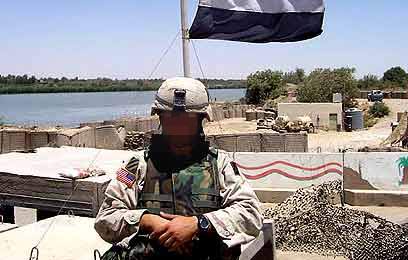
'The enlistment process wasn’t complicated at all.' Corporal David
From Givati to Ramadi
Ambushes in Lebanon and Gaza weren’t enough for Corporal David, who decided to volunteer for the US army and found himself battling insurgents in the heart of the Iraqi inferno
“For a moment I was scared to death. I was in a building and I heard explosions and gunfire coming from every direction. The hardest thing was when one of the company’s armored vehicles drove over an explosive device and my friends were killed.”
This young corporal from northern Israel, a “tzabar” for all better purposes and graduate of an Israeli high school, is not talking about his IDF service. His story is in the third division of the United States Army. The battlefield: Iraq.
David, 25, wasn’t satisfied with ambushes in Lebanon and the front lines in Gaza while serving in Givati’s Shaked battalion. After he completed his IDF service he went to the U.S. to travel and work, but after two of his friends were killed in the territories, he decided to change his plans.
“I wanted to go back to the army, to continue to contribute. In Israel it didn’t really work out, and then I had an idea. As the son of American-born parents, I would volunteer for the U.S. Army. The enlistment process wasn’t complicated at all, the hardest part was getting my high school diploma translated,” David says.

'I wanted to go back to the army.' David in Iraq
Soon enough, David found himself in basic training, then advanced training, and then he flew to Iraq in 2005 to the heart of the inferno. Since he left for the U.S., this is his first time back in Israel for a brief visit before he returns to the United States. David tells Ynet his story.
On basic training: ‘The discipline is insane’
“In basic training one of the officers didn’t like the fact that I wouldn’t eat bacon,” David recalls. “I explained to him that I don’t eat pork, and he wouldn’t accept that. He told me not to leave anything on my plate. Of course I left the bacon, and he didn’t say anything. In general, the discipline in basic training is insane, compared to the IDF. They put a great emphasis on discipline. There were some funny things that we learned too, different from the way things are taught in Israel.”
The U.S. Army has a mosaic of soldiers of different ages, backgrounds and mentalities, which David said he enjoyed, and he decided to sign on for five years. “My parents had a hard time with the idea, but they understood me. Some of my friends said I was crazy, because I was so far away from them and mainly because I was risking my life.”
And then I reached Ramadi…
When David was sent to the third division, a ready infantry unit, he knew he would end up in Iraq eventually. In January 2005, his unit started training for the mission, and shortly afterwards he found himself in Kuwait. “And then we started the mission in Iraq,” David relates the drama of the next few months.
“We set up in a dilapidated Iraqi base, which became our outpost. There were a few shooting attacks, nothing extraordinary. Within two months we were transferred to the scariest place in Iraq: Ramadi, in the west, not far from Fallujah. Many soldiers were killed and wounded there.”
Once, David and his friends came under fire, and they shot at the source of the shots from their vehicle. “The shooters ran away into a mosque, there were at least 30 dead insurgents there. After that they claimed we shot at innocent targets.”
In August 2005, David witnessed an Al-Qaeda attack in Iraq. “A truck full of explosives blew up next to a building full of American soldiers,” he says.
Two months later he lost three friends from his unit when a mine exploded under their vehicle.
David will likely never forget when insurgents ambushed his unit and hid inside a house. “Suddenly we were under fire from all directions. I felt like there was a sea of terrorists around me. We were along a route called the Michigan Corridor, where there were many attacks, and it reminded me of the Philadelphi route between Egypt and Israel,” he remembers.
“I had frightening moments in Gaza and Lebanon too, but this was different, it was a real war.”
Bamba, Bisli and the ‘Miracle of Rubaiyat’
In the off-time, David prepared the “Miracle of Rubaiyat” for his friends, according to a recipe he learned in Givati (“Elite Instant coffee with milk, shake it real well”). His family sent him packages from Israel with Bisli and Bamba. He was even able to listen to Galgalatz over the Internet. David kept his Givati fighter’s pin in his pocket at all times, and it stayed with throughout his months of battle in Iraq.
All in all, David has no regrets about enlisting in the American army. “As a soldier in Iraq you get about USD 2,000 salary, plus an endangerment bonus, which is a few hundred at least,” he reveals.
He was able to keep in touch with his family over the Internet: “I tried to update them as often as I could, but it wasn’t always possible. It wasn’t easy on them to have one son fighting Palestinians in Nablus and another son facing off with insurgents in Iraq.”
David took advantage of his short vacation in Israel to spend time with his family, hike along the Banias, and drop by Azrieli. He’s got a ticket to go back to the U.S. at the end of the week.
“Clearly my IDF service helped me professionally very much. Everyone there knew my past. The funniest part was the Iraqi soldiers thought I was Arab.” And when he goes back to America? Right now I’m not slated to go back to Iraq. But I’m thinking of doing an officers’ course. “You need to finish a bachelor’s degree for it. We’ll see if I make it…”










